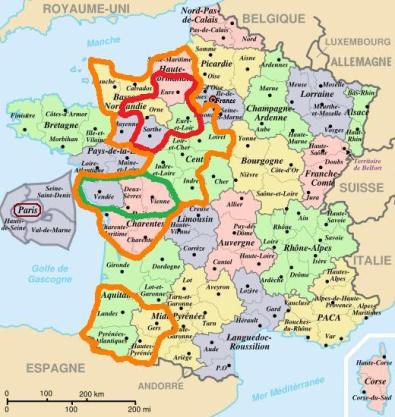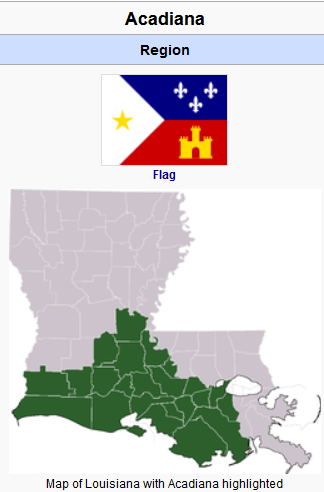Acadie
This past summer my wife and I ventured through Eastern New England/Yankeedom (a.k.a., the Canadian Maritimes), and it involved a trip through the remnant of the French colony of Acadia, which in actuality is quite alive and well. In my final post of 2013, I will discuss these fascinating people.
Acadia was the French colony that initially spanned the Canadian Maritimes and eastern Maine (maps from Wikipedia):
- The border between Acadia and New England, as claimed by the French, was the Kennebec River, seen here on a map of modern Maine
The colonist there largely originated from the section of France circled in green (outlined by HBD Chick):

The Acadian colony was conquered by the British in 1710 (after a long period of tension and skirmishes with New England). At first, the British tolerated the Acadian inhabitants, but by the time of the French and Indian War (a.k.a., the Seven Years’ War), the Brits decided the Acadians had to go, so the colony’s French inhabitants were deported. I acquired this poster of their history, which covers the deportation, the migrations, and the eventual return of some of the settlers (to the new thoroughly British) Maritimes.
The deported Acadian colonists scattered across the Atlantic to find refuge. Some managed to escape to Quebec, while others returned to France. Many tried to seek refuge in the American colonies along the East Coast, and some managed to do so in New England. However, they were largely denied, especially across the Tidewater and the Deep South (to where the Roman Catholic “French Neutrals” were not welcome). A great deal of the deportees died in the migrations. A good number of Acadian settlers who had returned to France and were scattered elsewhere later converged on Louisiana, where they became the Cajuns.
This is reflected in the modern New French region of Louisiana, Acadiana:

Eventually, after the Seven Years’ War had ended, some Acadian refugees were allowed to return to their former colony in the Maritimes, giving us the modern Acadia we now have. The British however had already taken much of the prime real estate in the colony, relegating the Acadian resettlers to marginal areas along the colony’s periphery.
Life in the new Acadia developed around smoking fish and sea products, done as a way to preserve the meat. Large smoke houses sprung up along the coast, becoming family enterprises with know-how passed down from generation to generation:
Today, Acadia consists of a few narrow strips along the coastal Maritimes and northern Maine:
The Acadian presence in Maine is why, on my maps of the American nations, I have placed part of Aroostook county into New France:

The Acadian legacy also survives on in Maine in certain place names (like Acadia National Park).
In both New England and in Louisiana, the Acadian identity is distinct and strong:
In Louisiana, the Cajuns established a distinct identity from the Deep Southerners around them. When the Deep Southern plantation colonists arrived in Louisiana, they found a society that they found detestably different from their own. Under the French, Blacks were not initially relegated by racial caste as slaves, and indeed many Blacks were prominent slaveholders themselves. As many of the Cajuns and Blacks in Acadiana originated from Haiti, the Caribbean flavor was distinct and powerful (visible in Louisiana Voodoo). Louisiana was much less sexually modest than the British derived colonies, something Acadiana retains a reputation for this day:
The Acadians seem to have an interesting genetic legacy as well, especially those in Louisiana. Like the Québécois, they have a much higher incidence of certain rare genetic disorders, such as Tay-Sachs disease. Peter Frost speculates that in the case of the Québécois, there was selection for intelligence similar to that of the Ashkenazi Jews. However, as far as I know, it is unclear what the situation with the Acadians could be. I would imagine that almost certainly, this is related to founder effects due their very small founding population (a few hundred in some regions).
So, my observation of the Acadians: they seem to be unlike their New England neighbors in that they don’t have the automatic cheerful friendliness Yankees typically display to outsiders. Indeed, one fellow was staring at me as if he couldn’t tell what to make of me. This wasn’t because there were no other Blacks around; I saw a handful in the area.
Also, it seems older gentlemen appear to like to gather together in the local eatery and (loudly) discuss what’s what. Perhaps this is a general Mediterranean thing?
Coincidentally, while my wife and I were in the Maritimes, we watched a Tommy Lee Jones film called In the Electric Mist, which takes place in Cajun Louisiana (good movie, by the way). The film featured the song “La Terre Tremblante,” about the life in Louisiana, here performed by a French band. I thinking it is a fitting song for this post:
Here are the lyrics and their English translation (from here):
FRENCH LYRICS
Les pêcheurs mettent leurs lignes comme des
araignées
Piégeurs, voleurs des âmes
Les attrapes sont mises pour les innocents
Gambleurs, éviteurs des blâmes
Descends
Allons
Descends
Dans l’eau saumâtre
Reviens
C’est rien
Reviens
A la terre tremblante
Les voleurs, ça met leurs appâts sur la ligne
La bouteille, la fierté et l’argent
Ça voit pas qu’ils sont piégés pour toujours
Dedans un fil étranglant
Descends
Allons
Descends
Dans l’eau saumâtre
Reviens
C’est rien
Reviens
A la terre tremblante
ENGLISH TRANSLATION:
The fishermen set their lines like
spiders
Trappers, stealers of souls
The traps are set for the innocent
Gamblers, shirkers of blame
Descend
Come on
Descend
Into the brackish water
Return
It’s nothing
Return
To the quicksand
The thieves put their bait on the lines
The bottle, pride, and money
They don’t see that they are trapped forever
In a strangling web
Descend
Come on
Descend
Into the brackish water
Return
It’s nothing
Return
To the quicksand
The song is featured throughout the score of the film. Here is the musical suite from the movie, which I believe is a fitting ending tribute to this year in HBD, especially the section from about 7:50 onward.
And with that Happy New Year to you all. See you in 2014!





















merci, c’est tres interesante, et la musique est belle!
i would think “a la terre tremblante” would be “to the trembling earth” or “as the earth trembles,”
but the song’s author says “to the quicksand” & he should know:)
the French language spoken in Quebec is older French (more pure — or archaic, if you like), since the language split off from the mother country in the 1700s – & then morphed further down in the bayous.
I had a friend in boot camp in the late 1970s who was cajun & proudly called himself a “coon-ass” – there seems to be some argument over the etymology (& the “offensiveness”) of that word – but he sure liked it! i love cajun folk music, play accordion, & speak some french – french is a very easy language to rhyme in – perfect for music:) merci beaucoup – adieu! (see? easy rhyme:)
Thanks for the post. I’ve always wondered about the Francophone part of New England. I had no idea it was THAT small; no wonder why I could never find anything on Google.
@Messi:
The predominantly Francphone part is small, but you can find French-speakers scattered across much of the region. Where I live they are quite a few.
Additionally, a significant percentage of the people who live here, especially along the Canadian border, are of New French descent (they came to New England in large numbers during a wave of immigration).
longtime reader, lurked until the present because I had nothing to contribute. THRILLED to be part of the discussion. Acadie, for my money, is now best preserved in New England former mill cities like Manchester, NH, Lewiston ME and Lowell, MA. It is VERY common to see “acadian food” throughout the Maritimes and NE, but in those places you see it in “acadian packaging”. Ie using the slightly mis-spelled (to Standard Francophone eyes) “gorton” and the like. Also, the predominant last name will be french, but of acadian descent. As an example, think of guys like Jack Kerouac.
Modern Aroostock (have you ever been, JayMan? I’d love to send soem pointers if you’re heading up that way!) is mostly depopulated now, the children of The County end up in Lowell, Portland, Boston and Manchester. But the thing to note is they take their French with them.
@Anonymous:
Well, I’m glad we could include you! 🙂 Yes, there is a heavy French influence across New England. A lot of Quebecois came to the area, but it would be interesting to compare the Quebecois influence to the Acadian one.
I have been to Aroostook county, but haven’t explored the area well. I would like to give it a go again soon. Feel free to share any tips. Thanks!
Your choices in residency and vacation destinations should make people more suspicious of your claims about African ancestry than anything you write!
And yes, I can attest from personal interactions that Jayman is indeed black.
Fortunately the previous post just uses the troll as a starting point for a post that marshals a ton of data people can’t see enough, but I still empathize with you for having to put up with such tripe.
@Audacious Epigone:
Yup, the trolls have their uses. I’m sure he’ll come up with more to keep up busy…
I went to LSU and UNO in the 70s, but grew up in a completely different state: north Louisiana. It took most of a year to acclimatize myself to local ways, including proper usage of “coon-ass.” (Starting with my very first night at LSU, when I nearly lost my entire semester’s tuition learning to play bouree -the card game, not the song.) A fellow freshman who was a self-described RCA (registered coon-ass), was my principal guide in this department. It wasn’t an only-we-Xs-can-say-X, but it wasn’t anything-goes, either. The main principles were 1) once a non-CA became a good enough friend with a CA, he could refer to him as a CA with impunity, 2) if less than good friends, be sure you were smiling (and sincerely) when you said it, and 3) avoid altogether with strangers. Especially drunk strangers. As late as 1980 these still were the norms, but a generation of victimology may have eroded this congenial arrangement. Yet I’ll wager that your authentic Cajun is still immune to radical Anglo word puritanism. It’s all about regard down there. Spoken with sufficient affection and respect no word offends, without them any word will. And Registered Coon Ass license plates were *very* common back in the day. (Google image shows a variety of examples.) Laissez-rouler les bon temps!
@Brian:
There you have it. Thanks for sharing, wish I knew more about the area from direct experience! 😉
I see Vendee on the French map. They had a counter-rebellion during the French Revolution. The area appears to still vote conservatively, based on recent election returns.
I also recall that the Cajuns are the only genetic group in the US who have leprosy in any numbers